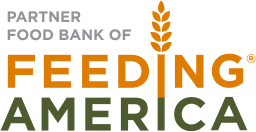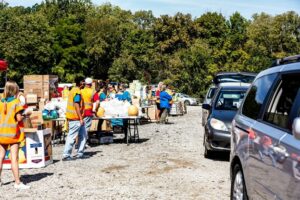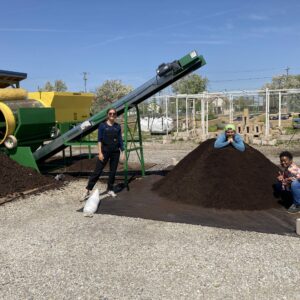“Food Pharm” program at Dayton Children’s Hospital addresses childhood food insecurity in-clinic
The program, a partnership between the hospital and The Foodbank, has served almost 1,000 families in the two years since its launch
By Emily Gallion, Grant & Metrics Manager/Advocacy Manager, and Caitlyn McIntosh, Volunteer/Intake Support
While all households have been impacted in some way by the COVID-19 pandemic, some of the worst demands have been placed on families with children.
A study by The Anne E. Casey Foundation detailed the harmful effects of the pandemic on households with children. In September and October 2020, 14% of individuals in households with children reported they sometimes or often did not have enough food to eat. Alarmingly, 34% also reported they had delayed seeking medical care in the previous month.
These figures are a stark reminder that food is a health issue. Prior to the pandemic, families with children in our area already had difficulty accessing enough food to live a healthy, active lifestyle. In 2019, 30,870 children in the Miami Valley were reported food insecure by Feeding America.
Children and adults who experience food insecurity are at higher risk for a host of negative health outcomes. An extensive body of research has demonstrated that children who are food insecure are more likely to be hospitalized, have health concerns such as anemia and malnutrition, and experience mental health issues.
Partnerships between healthcare organizations and community based providers are essential to addressing the intersection between food insecurity and health. One of those partnerships is the Food Pharm program at Dayton Children’s Hospital.
Through this program, families with children identified as needing additional food are offered a box of healthy shelf stable food to take home. The Foodbank also supplements the shelf stable food boxes with fresh produce. The contents of the box, which is designed to feed the entire family, were selected by dietitians at Dayton Children’s Hospital. In the two years since its launch, the program has served almost 1,000 families.
Emily Callen, Dayton Children’s Community Food Equity Manager, said that the program has helped Dayton Children’s Hospital to understand the circumstances that lead families to needing food assistance, including natural disasters like the 2019 tornado outbreak, the pandemic, and household financial crises.
“Need arises in so many ways, and everyone is just trying to protect their kids from the realities of their financial struggle and make sure their kids have a meal they enjoy,” Ms. Callen said. “We think our program helps do this for at least a short period of time, while also helping families get connected to longer term resources, so families always have a meal on the table.”
Ms. Callen said she has been able to teach other hospital departments about food insecurity using the program.
“This program allows us to serve the emergency needs of families while they get connected to local food pantries, or other resources like the Supplemental Nutrition Assistance Program (SNAP) and Women, Infants, and Children (WIC),” Ms. Callen said. “By offering these boxes, it is our hope we can relieve the stress that comes along with food insecurity and help families to focus on whatever medical care they need.”
Moving forward, Ms. Callen is administering a survey to better understand the food needs of the families the program serves. The study will evaluate how well the food boxes meet cultural food needs and inform future food selections. Ms. Callen said, “At the end of the day, if people aren’t eating the food we serve in the boxes, we aren’t feeding hungry people.”
As COVID-19 and the new Delta variant continue to impact families in our community, we will continue to partner with local organizations allied in the fight against hunger. We are grateful to work alongside community organizations, including Dayton Children’s Hospital, that are dedicated to addressing the Social Determinants of Health in our area.





No comment yet, add your voice below!